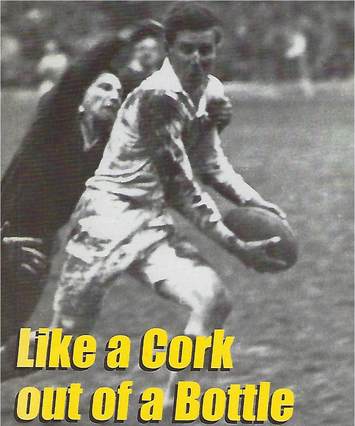There is a great Anglo-Saxon poem called The Dream of the Rood, by an unknown author. I have just rediscovered it for myself. The rood is the Cross, which suddenly speaks:
I was deemed in former days the direst of torments
I was hated and abhorred until I made a highway,
The right way of life, for the human race.
Lo, the King of Glory favoured me above all the trees of the forest.
Death he drank there; yet from death the Lord arose
With might and power to be man's helper....
He will ask in sight of many where is the man
Who for the Lord's sake would give up life,
Drink bitter death as He did on the beam....
But none need be afraid to abide His appearing
Who has borne in His bosom this brightest of beacons.
For through this Cross shall come to the Kingdom,
From this earthly life, each and every soul
Who longs with his Lord to live in life everlasting.
The poem goes on:
Then I prayed to that blessed Beam.... I live my life in hope
That I may trust and seek that Tree of Triumph,
Alone honour and serve it above all the others
This is my heart's desire; in this is my delight.
The hymn which begins, 'When I survey the wondrous Cross,' has been a favourite for people for three centuries. It ends: 'Love so amazing, so divine, demands my soul, my life, my all.'
It was Gandhi's favourite.
Gandhi's autobiography, The Story of My Experiments with Truth, is a must for anyone who seeks to be a nation-builder. He writes: 'To see the universal and all-pervading spirit of truth face to face one must be able to love the meanest of creation as oneself. And a man who aspires after that cannot afford to keep out of any field of life. That is why devotion to truth has drawn me into the field of politics. Identification with everything that lives is impossible without self-purification. I must reduce myself to zero.'
Charming people without the Cross only draw people to themselves.
It is not that I deliberately choose the difficult road. But I reject the ways of the world which put me in the centre of things: my success, my glory, my fulfilment.
The disciples of Christ at the beginning of their three years' training had to give up all they possessed. Only at the end of their time did they begin to give up themselves. In fact whenever Christ mentioned the Cross, they began fighting Him or each other. They held to the idea that His kingdom would be political not spiritual.
Michael Green, who was rector of our church in Oxford, St Aldate's, wrote in his book, To Corinth with Love: 'The Cross is the corrective for false ideas of leadership.'
I remember first taking God seriously in my life when I was confirmed in the church at 14. In a general way I gave my life to God and began to walk a new road. Then when I was a student at 22, the road became more definite. I was confronted with a challenge to give my will to Jesus Christ.
I love that word of the sixth century Irish monk, St Brendan: 'If you become Christ's man, you will stumble on wonder upon wonder and every wonder true.'
Living at the Cross, walking the road of purity, means I can genuinely love people. The Pope said: 'You either love people or you use them. If you love people you make friends, if you use them you make enemies.'
The French 19th century saint, Charles de Foucauld, wrote: 'To love anyone is to hope in him for always. From the moment we begin to judge anyone, to limit our confidence in him, identify him with what we know of him and so reduce him to that, we cease to love him, and he ceases to be able to become better. We should expect everything of everyone. We must dare to be love in a world that does not know how to love.'
The Cross can enable us to express that kind of love.
St Paul wrote to the Philippians: 'Do nothing in a spirit of selfish ambition and in a search for empty glory. Do not concentrate on yourself and your own interests.' Concentration on self inevitably means to eliminate others.
I'm always reading through the Psalms and discovering verses that I've missed. Recently I found this in Psalm 26: 'I will wash mine hands in innocency, so will I compass Thine altar, O Lord, that I may publish with the voice of thanksgiving and tell of all Thy wondrous works.'
Wash, worship, publish, thank God.
Washing myself enables me to become a cleansing force. Listen to this word from Amy Carmichael, missionary and writer (1867-1951): 'Very earnestly I would say to anyone who is responsible for the purity of a work, at all costs keep it pure. To do so would cost far more than you dreamed it would. Do not falter. To falter is to sap the very foundations of that which was committed to you to guard. Cost what it may, resolve to build only precious stones into your garden wall.'
As you look at the future, marriage, career and the long adventure ahead, I would make a suggestion. Sit quietly and unhurriedly before a crucifix or a picture of Christ on the Cross - maybe in a chapel - and think on these words of an old hymn:
This hast Thou done for me -
What have I done for Thee,
Thou crucified?
I long to serve Thee more;
Reveal an open door,
Saviour to me;
Then, counting all but loss
I'll glory in Thy Cross,
And follow Thee.
William Penn wrote: 'No Cross, no Crown'.


